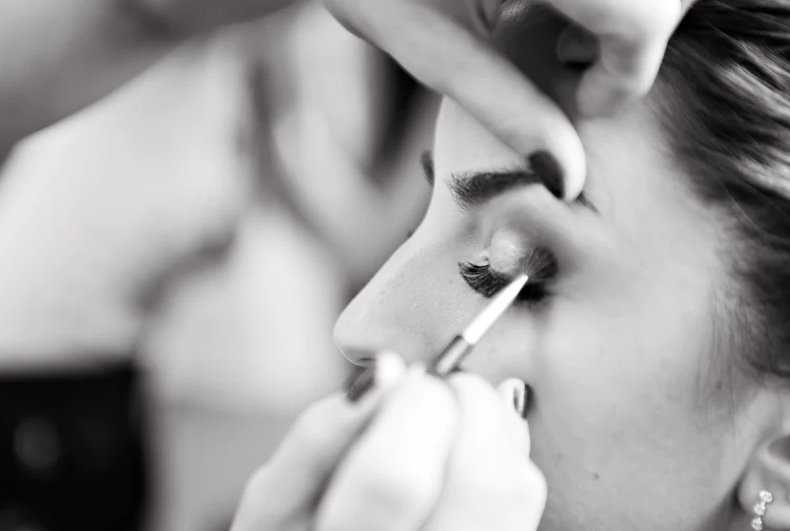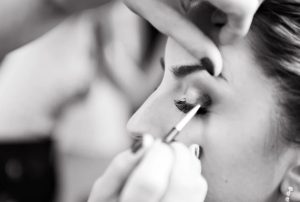
Your habits may diminish your vision.
It has been said the eyes are the window to the soul.
They also can serve as the window to the world.
Taking care of these miraculous sensory organs allows you to maintain better eyesight as you age.
According to a recent Money Talks News article titled “6 Common Habits That Can Damage Your Vision,” some habits are detrimental for eyesight.

Applying makeup correctly can protect your vision.
What are they?
Eating a poor diet.
Another maxim is you are what you eat.
Not surprisingly, consuming a diet rich in certain nutrients can have specific health benefits.
The American Academy of Ophthalmology specifically lists lutein, omega-3 fatty acids, zinc, zeaxanthin, and vitamins C and E as benefiting the structure of the eye.
By eating foods rich in these nutrients, you can reduce the risk of cataracts, age-related macular degeneration, and dry-eye syndrome as you get older.
What foods include these nutrients?
Vitamin C is found in broccoli, red and green peppers, grapefruits, kiwifruit, oranges, strawberries, and tomatoes.
Avocados, almonds, olive oil, and sunflower seeds are excellent sources of vitamin E.
Zinc is commonly found in legumes, dairy, eggs, seeds, meat, and seafood.
To specifically support the retina, you can eat foods like leafy green vegetables, mangos, papaya, peaches, and raspberries to include zeaxanthin and lutein in your diet.
Rubbing your eyes.
Although rubbing your eyes may seem fairly innocuous, bacteria found on your hands can enter your eye and cause infections.
Rubbing hard and frequently can also damage the corneas.
In some instances, it can lead to a bulging and thinning of the cornea know as keratoconus.
Looking at your smartphone.
Screens can be hard on human eyes.
Research has demonstrated a higher risk of age-related macular degeneration if you do not give your eyes a break from smartphones and other technology.
A guideline provided by the American Academy of Ophthalmology involves taking regular breaks every 20 minutes.
They recommend shifting your eyes to look at an object at least 20 feet away for at least 20 seconds to support vision health.
This is referred to as the 20-20-20 rule.
Not wearing sunglasses.
The ultraviolet rays from sunlight can severely damage the eye and your vision.
The front part of the eye with the lens and cornea can be damaged by UVB light.
UVA rays have been connected to a diminished ability to see clear details when the macula is damaged.
Additionally, common conditions associated with sunlight include macular degeneration and cataracts.
How can you reduce this risk?
You can protect your vision by utilizing sunglasses with the ability to block 99 percent to 100 percent of UVB and UVA rays.
Applying makeup incorrectly.
Applying eye makeup can prove problematic for your vision.
If you apply makeup up to the eyelid margins where eyelashes grow, you can block oils glands and cause irritation or dry eye.
When you place makeup near the waterline where your eyelids meet your eye, you may trigger an infection from introducing bacteria.
Yikes!
Sleeping without removing your contact lenses.
Although you may feel too exhausted to remove contact lenses at the end of the day, you should not skip this part of your daily routine.
Not only will your corneas not be able to breathe and get the air they need, your eyes and lenses could dry out.
As a result, you could damage your eyes by trying to remove the lenses in the morning.
Infections are also a common result of keeping contact lenses in overnight.
Speaking from personal experience, I enjoy that taking out the old contacts at day's end.
If any of these habits are reflected in your day, making changes can support healthy vision over time.
Reference: Money Talks News (Dec. 5, 2022) “6 Common Habits That Can Damage Your Vision”
REMEMBER: “The choice of a lawyer is an important decision and should not be based solely upon advertisements.”
This statement is required by rule of the Supreme Court of Missouri.
